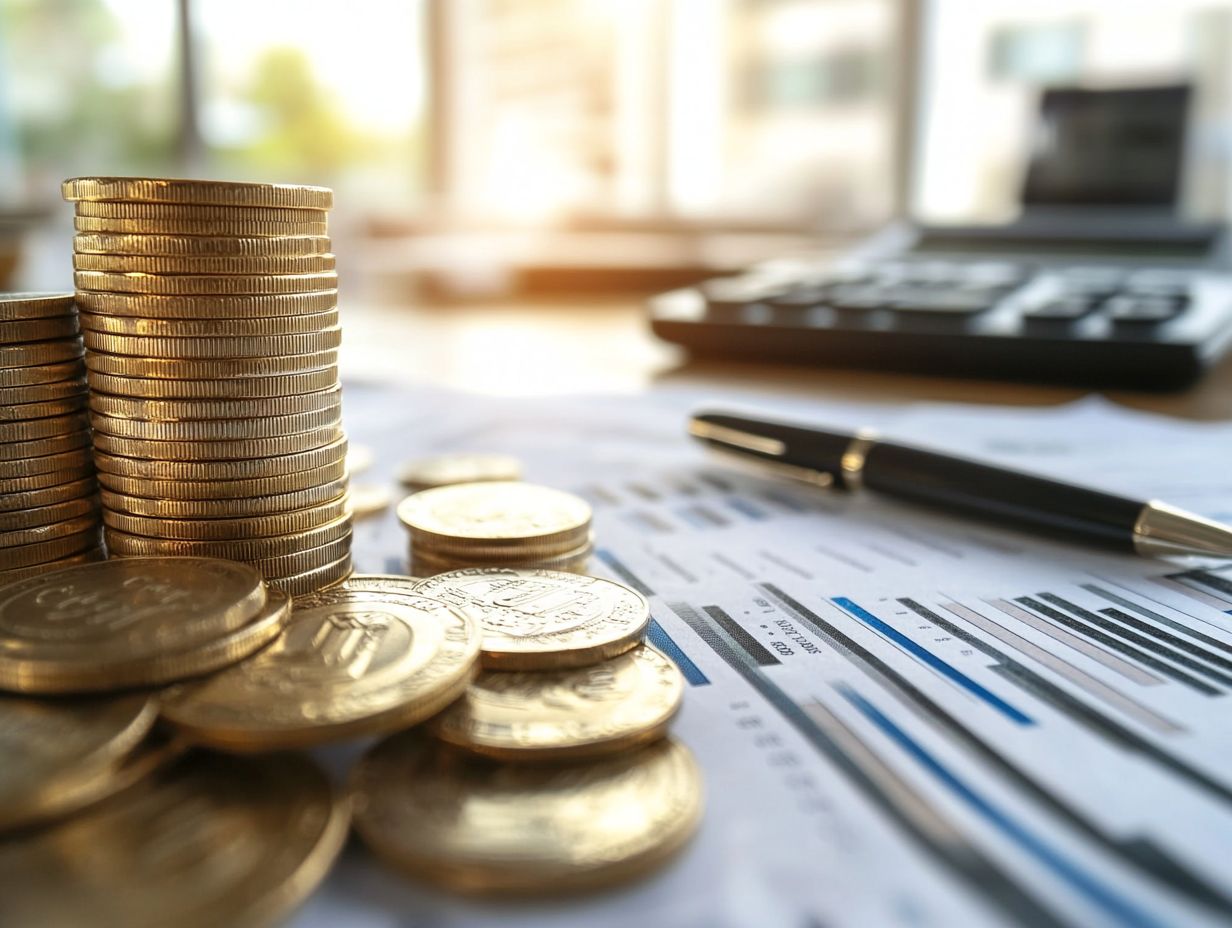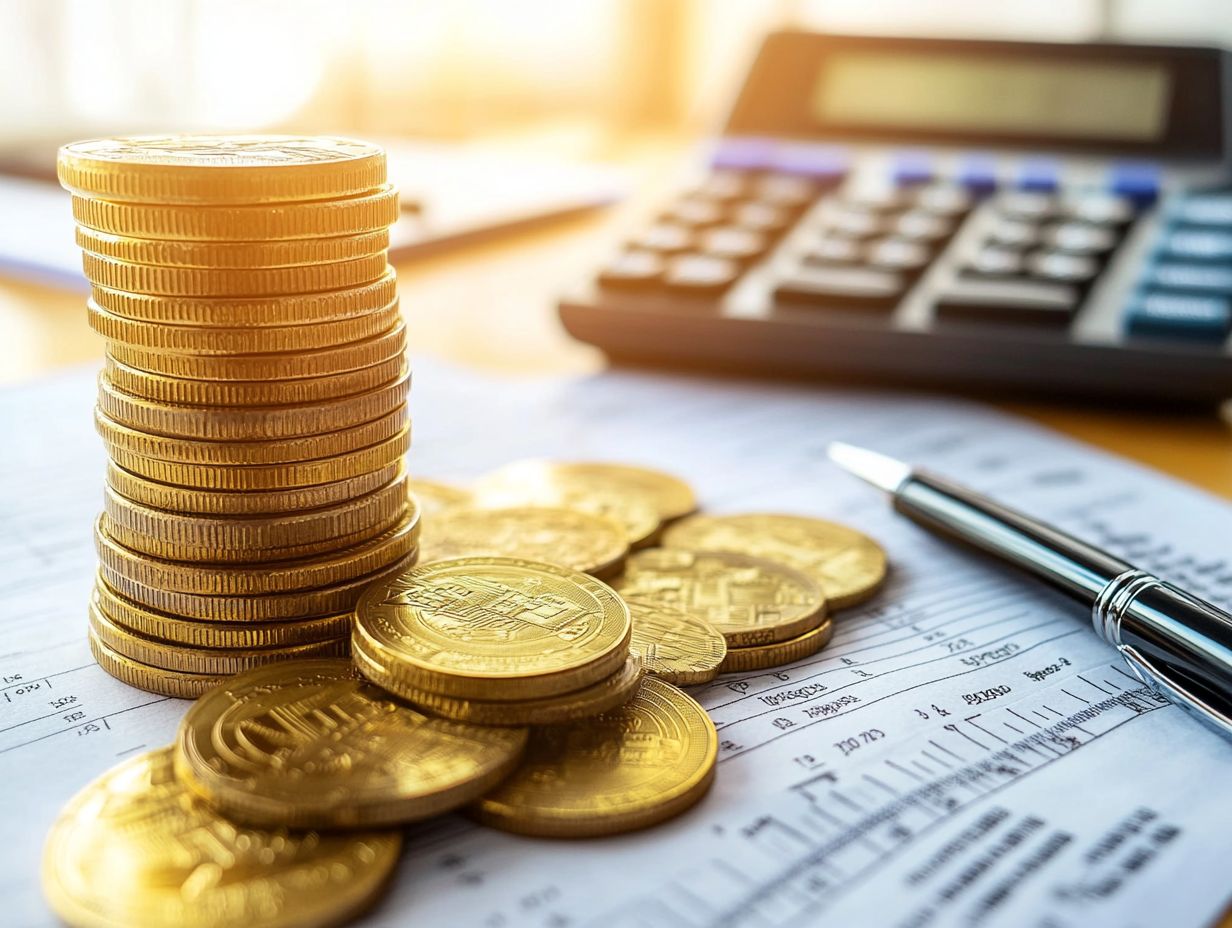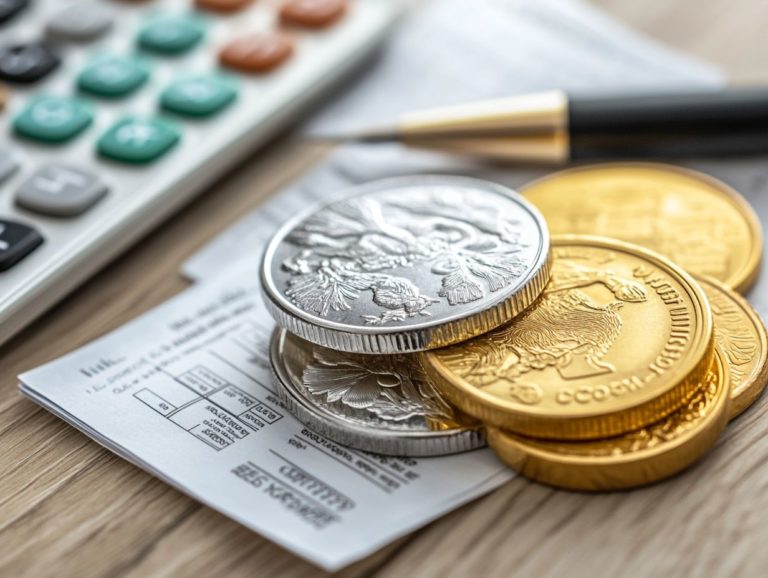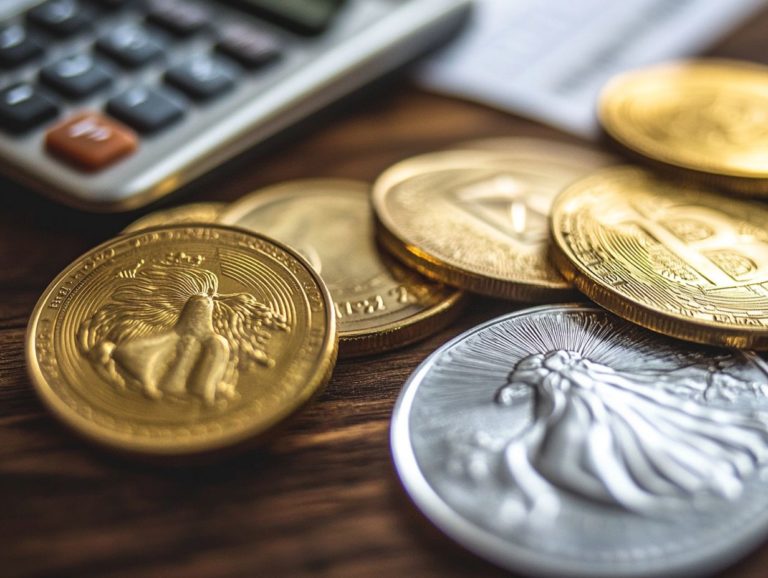Tax Reporting for Precious Metals Investments
Ready to explore the exciting world of precious metals? Let s dive into how investing in them can secure your financial future! Investing in precious metals can be a highly rewarding endeavor, providing you with both tangible assets and a reliable hedge against economic uncertainty.
It’s essential for you to navigate the complexities of tax implications that come with this investment.
This article delves into the various types of precious metals at your disposal, the advantages of investing in them, and the specific tax obligations you might encounter.
It also outlines strategies to maximize your tax benefits while highlighting common pitfalls to steer clear of, ensuring your investment journey remains both profitable and compliant.
Explore the insights presented here to learn how to optimize your precious metals investments while keeping tax considerations at the forefront.
Contents
- Key Takeaways:
- Overview of Precious Metals Investments
- Tax Implications of Precious Metals Investments
- Tax Strategies for Precious Metals Investors
- Common Tax Mistakes to Avoid
- Frequently Asked Questions
- 1. What is tax reporting for precious metals investments?
- 2. Which types of precious metals investments require tax reporting?
- 3. Do I need to report my precious metals investments even if I haven’t sold them?
- 4. Are there any tax benefits for holding precious metals investments?
- 5. How can I ensure accurate tax reporting for my precious metals investments?
- 6. What happens if I don t report my precious metals investments on my taxes?
Key Takeaways:

- Understand the types of precious metals and their benefits as an investment option.
- Be aware of the tax implications and reporting requirements when investing in precious metals.
- Utilize tax strategies to maximize benefits and minimize liabilities, and avoid common tax mistakes.
Overview of Precious Metals Investments
Investing in precious metals like gold, silver, and platinum is a smart choice for diversifying your financial portfolio and elevating your wealth management approach. These tangible assets serve not only as a safeguard against inflation but also as a cushion during economic downturns.
By grasping the various investment vehicles at your disposal, including exchange-traded funds that allow you to invest in a variety of assets and physical bullion, you can profoundly impact your financial growth and secure impressive long-term returns.
Types of Precious Metals
The primary types of precious metals include gold, silver, and platinum, each presenting unique characteristics and investment opportunities tailored to your portfolio. Whether you re considering gold bullion, coins, or bars, these metals fulfill various roles, from hedging against inflation to capitalizing on future market trends.
Historically, gold has been viewed as a symbol of wealth and stability, often in high demand during times of economic uncertainty. Silver, with its industrial applications, sees its value fluctuate based on consumer demand and investment trends. On the other hand, platinum, rarer than both gold and silver, is garnering interest due to its applications in high-tech industries.
You can access these precious metals through various vehicles, such as exchange-traded funds (ETFs) that monitor market performance, or by purchasing physical assets like collectible coins. It’s important to understand how to handle tax reporting for precious metals investments, as these may appreciate in value over time.
Benefits of Investing in Precious Metals
Investing in precious metals presents you with a wealth of advantages, including protection against inflation and enhanced opportunities for financial growth. By incorporating these assets into a diversified portfolio, you can effectively mitigate the risks associated with market volatility.
These metals typically maintain their intrinsic value during economic downturns, making them a dependable hedge against unpredictable market shifts. By adding such assets to your investment strategy, you can not only safeguard your capital but also increase your overall returns over time.
The favorable tax implications of precious metal investments make them even more appealing. By understanding how these factors interconnect, you can make informed decisions that bolster your financial stability and growth, ultimately paving the way for a more secure future. Additionally, learning how to prepare for potential tax changes in precious metals is crucial for maximizing your investments.
Tax Implications of Precious Metals Investments

Understanding the tax implications of investing in precious metals is essential for you as an investor. The IRS classifies precious metals as collectibles, which means they are subject to different capital gains tax rates compared to other investment options.
This distinction can have a significant impact on your overall tax liability and reporting responsibilities, making it vital for you to stay informed about the current tax laws.
Stay ahead of the game by understanding these tax implications now your financial future depends on it!
Capital Gains Tax on Precious Metals
Understanding capital gains tax is crucial for investors in precious metals. The tax implications vary significantly based on how long you hold your assets.
The IRS classifies profits from selling precious metals as collectibles. This means they face a capital gains tax rate of 28 percent for long-term gains. This is quite different from the treatment of stocks or ETFs.
If you hold onto your precious metals for more than one year, you could see a reduced tax burden. This could enhance your overall returns and help you build a stronger long-term investment strategy.
If you find yourself dealing with short-term capital gains from precious metals, be prepared to face ordinary income tax rates, which can be considerably steeper.
Reporting Requirements for Precious Metals Investments
As a precious metals investor, knowing your reporting rules is vital. This includes the precise reporting of taxable transactions.
Forms like Form 1099-B are not just bureaucratic red tape; they are essential for reporting gains and losses. This ensures you remain compliant with tax laws while managing your tax obligations effectively.
You should familiarize yourself with Form 8949. It plays a crucial role in detailing each sale of precious metals, including the purchase price and sale proceeds. This documentation is vital for accurately calculating your capital gains or losses, especially considering the tax implications of selling silver investments.
Tax regulations for precious metals can be complex. Consulting a financial advisor can be a game-changer. An advisor can provide valuable insights into strategic tax planning and help ensure that all relevant forms are submitted on time.
With the right guidance, you can optimize your portfolio while staying in line with IRS requirements. Don t risk penalties make sure all forms are submitted on time!
Tax Strategies for Precious Metals Investors
Implementing effective tax strategies is essential for you as a precious metals investor. This is especially true if you’re aiming to maximize your financial growth while minimizing tax liabilities.
By grasping the intricacies of tax laws and collaborating with a qualified financial advisor, you can craft tailored strategies that enhance your investment returns and help you navigate potential pitfalls in tax planning. For specific insights, consider exploring precious metals and taxes.
Maximizing Tax Benefits

To maximize tax benefits from your precious metals investments, consider exploring various strategies. These include utilizing tax-deductible losses and implementing effective investment approaches that align with current tax laws.
By proactively timing the sale of assets to offset capital gains with losses, you can maintain a manageable taxable income. Familiarizing yourself with investment vehicles like IRAs that allow for tax-deferred growth can play a crucial role in optimizing your returns. Additionally, understanding the importance of tax withholding for precious metals can further enhance your financial strategy.
Consulting with a tax professional to identify eligible deductions or credits related to your precious metals can offer invaluable insights. Emphasizing the importance of continuous education on changes to tax regulations will empower you to adjust your portfolio accordingly, especially when it comes to planning for taxes when investing in precious metals.
Minimizing Tax Liabilities
Minimizing tax liabilities is essential for anyone venturing into precious metals investing. It plays a pivotal role in achieving overall financial success. By using targeted investment strategies and working with a knowledgeable financial advisor, you can navigate the complexities of tax planning and significantly reduce your tax burdens.
You may not fully understand the intricate tax implications associated with buying, holding, and selling these valuable assets. For example, knowing about taxes on profits from selling assets and specific IRS regulations regarding collectibles can profoundly influence your returns. Learning how to minimize taxes on precious metals sales can also be beneficial.
A financial advisor can evaluate your portfolio and identify tax-efficient strategies. These strategies may include utilizing retirement accounts or swapping similar assets for tax benefits. By leveraging tax-loss harvesting and tax-deferred accounts, you can enhance your overall investment performance.
Ultimately, staying informed and strategically planning can help you save a lot of money, highlighting the value of partnering with professionals who specialize in this niche area.
Common Tax Mistakes to Avoid
Navigating the tax landscape of precious metals investments can present numerous challenges. It’s essential to be mindful of common tax mistakes to avoid.
Neglecting to comply with IRS regulations or failing to recognize important reporting requirements can result in avoidable tax liabilities and complications, especially when considering the tax impact of precious metals in estate planning.
Tax Filing Tips for Precious Metals Investors
When filing taxes for your precious metals investments, follow specific tips to ensure compliance with IRS regulations while maximizing your investment profits. Thoroughly documenting your transactions and understanding reporting requirements are vital for a smooth tax filing experience.
Maintaining detailed records of your purchases, sales, and exchanges is crucial. This documentation can significantly influence your total taxable gains and losses. Track not just the price you paid for each asset but also any associated costs, such as storage fees or commissions. For a deeper understanding of the financial aspects, including navigating tax implications of precious metals futures, staying aware of key filing deadlines is essential to avoid potential penalties.
The IRS typically requires different forms based on the type of transaction. Familiarize yourself with relevant documents like Schedule D and Form 8949. Consulting with a financial advisor can further assist you in navigating these complexities, ensuring you maximize your deductions while remaining compliant with regulations.
Frequently Asked Questions

Here are some common questions people have about tax reporting for precious metals investments:
1. What is tax reporting for precious metals investments?
Tax reporting for precious metals investments refers to reporting any gains or losses from buying, selling, or holding precious metals such as gold, silver, or platinum to the relevant tax authorities.
2. Which types of precious metals investments require tax reporting?
Any type of precious metals investment including physical bullion, ETFs, mining stocks, and futures contracts may require tax reporting depending on specific investments and any gains or losses incurred.
3. Do I need to report my precious metals investments even if I haven’t sold them?
Yes, even if you have not sold your precious metals investments, you may still need to report any unrealized gains or losses on your tax return. Consulting with a tax professional is important to determine your reporting obligations.
4. Are there any tax benefits for holding precious metals investments?
In some cases, holding precious metals investments may offer tax benefits, such as a lower tax rate on long-term gains or the ability to defer taxes on gains until the investment is sold. However, these benefits may vary depending on your individual tax situation.
5. How can I ensure accurate tax reporting for my precious metals investments?
To ensure accurate tax reporting, it is important to keep detailed records of all transactions related to your precious metals investments. This includes purchase and sale dates, prices, and any fees or expenses incurred. Consulting with a tax professional for guidance is also recommended.
Don’t miss out on potential savings! Consult a tax professional or financial advisor for personalized advice.
6. What happens if I don t report my precious metals investments on my taxes?
Not reporting your precious metals investments correctly can lead to penalties and fines from tax authorities.
To prevent this, consult a tax expert and ensure you meet all reporting requirements.












